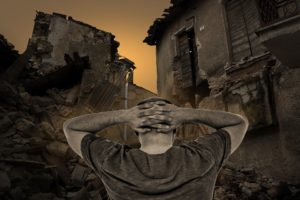Seven minutes to five. Tables were set, dinner was ready, and Grace was perched on the lips ready to be spoken. It was at this moment, a 7.0 magnitude earthquake hit the small island of Haiti, severely affecting the lives of three million people, with over 200 thousand of them losing their lives. A mere month and a half later, an 8.8 magnitude earthquake struck the Maule region of Chile, taking the lives of over two thousand people. And this was only in 2010. December 2004, entire villages and islands wiped out; West Africa, 1996, thousands lose their lives from a meningitis outbreak; Portugal, 1755 – the infamous Lisbon Earthquake. For millennia, the human race has been tested by disaster after natural disaster. Humans have turned to a higher authority for answers, but to this day – none have been given. Religion has failed to explain the existence of suffering – it has failed to answer the question “Why me?”.
The all-knowing and all-powerful being
Consider for a moment, that there is a God. He is all-knowing and all-powerful. He is aware of human suffering and has a hand in its execution and prevention. In His eyes, suffering tests us by providing the stage unto which we act out deeds of courage, selflessness, and faith. Ask any individual, and they will no doubt be able to name a negative experience and claim they have gained something from their trials. Not only does God try to educate the good with suffering, he also punishes the sinners. He is the supreme judge and protects the land from evil. This God also has a plan that will fall in place through the sacrifices of the human race. However, man cannot see the overall picture and immediately protests as the first mistreatment. Being a close-minded and simple race, the man should not criticize God because the judgments made are based on skewed observations. But do not worry, for God has mankind’s best interests in mind, you are just too naïve to see it.
God and his stance on suffering
These visions of God and his stance on suffering are full of contradictions – explanations are tacked on to one another without care for their effect on each other. God is supposed to have all our affairs under control – every decision we make having a designated outcome. The claim that God has absolute control over our lives and a grand design for the future negates the claim that humans have free will.
 If free will is negated, humans should not have the ability to err. If humans cannot err from their true path, evil cannot exist. Without evil, there is no need for God to educate or punish us. Ultimately, there is no apparent need for suffering. Following this logic, humans suffer needlessly. If God can put a stop to it, why doesn’t he? Coming from a similar standpoint, God can be either all-powerful or all-loving – not both. In James Wood’s essay, “Holiday in Hellmouth”, he expresses this argument effectively – “if he has the power to alleviate this suffering but does not, he is cruel; if he cannot he is weak.”
If free will is negated, humans should not have the ability to err. If humans cannot err from their true path, evil cannot exist. Without evil, there is no need for God to educate or punish us. Ultimately, there is no apparent need for suffering. Following this logic, humans suffer needlessly. If God can put a stop to it, why doesn’t he? Coming from a similar standpoint, God can be either all-powerful or all-loving – not both. In James Wood’s essay, “Holiday in Hellmouth”, he expresses this argument effectively – “if he has the power to alleviate this suffering but does not, he is cruel; if he cannot he is weak.”
There is yet another camp of believers, those that justify human suffering by saying God suffers along with us. If this is so, God has no greater control over our suffering than we do. This realization alone strips our so-called all-powerful God of much of his authority. To use Wood’s words again, “A God whose power has been so drastically limited, and who sounds so like us in our abject… why should he be worshipped?”






